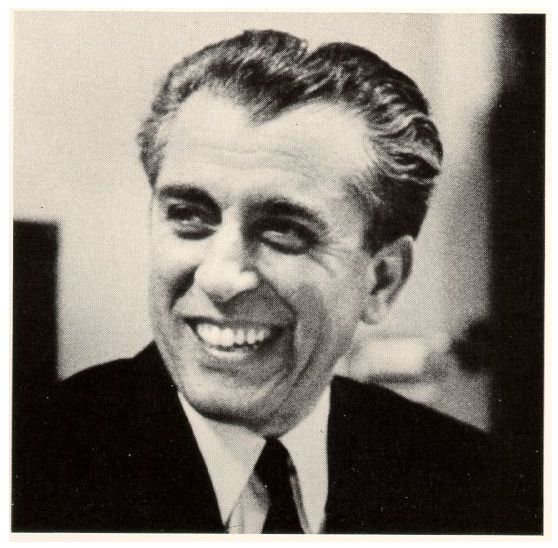

|
MICHAEL
V. LEPORE, 97
Imran Vittachi, Tribune staff reporter CHICAGOLAND FINAL January 24, 2004 Training aspiring singers who supplemented their incomes by holding down ordinary jobs, Michael V. Lepore channeled the voices of secretaries, printers and even grocery clerks into one of the most acclaimed operatic choruses. Mr. Lepore, 97, chorus master of the Lyric Opera of Chicago from its founding in 1954 through the 1974-75 season, died Friday, Jan. 23, in his Northwest Side home. "He was a great chorus master and a pillar of the Lyric," said William Mason, the opera company's general director. "He embodied everything that an operatic master should be. He was a man of great musical integrity." Among his achievements during his 20-year tenure, Mr. Lepore was responsible for training a local chorus for the 1954 production of "Norma" that first exposed diva Maria Callas to American audiences. He had a reputation of being a mild-mannered but stern chorus master. "He took a lot of people who didn't have a lot of experience," said his wife, Sharon, one of his trainees in the late 1950s and early '60s. "He was a taskmaster and a perfectionist, but he got wonderful results." Born in Brooklyn, N.Y., Mr. Lepore was one of three sons of Italian-Americans. He trained as a concert pianist from a young age. In 1924, at age 17, he performed his debut solo recital at Aeolian Hall in Manhattan, playing Beethoven's "Appassionata" Sonata, his wife said. Before being forced to abandon his career as a pianist because of a finger ailment, he studied piano and music theory in Florence, Italy. In 1961 he was awarded Italy's honorary title of cavaliere for his contributions to Italian opera. Mr. Lepore would go on to assist conductors at opera houses and ballet companies in Philadelphia, Cincinnati and New York. Mr. Lepore moved to Chicago in 1954 for the Lyric's inaugural season. During the company's first 15 years, he spent weeknights training chorus members who relied on day jobs to make ends meet. "The work isn't easy and the sacrifices many," Mr. Lepore said in a 1969 Tribune article. "Rehearsals often run five hours a day, and considering that most members must hold down an additional full-time job, scheduling becomes a big problem." His wife said that before the advent of all-professional choruses, singers couldn't make a living on opera alone, particularly in the off-season. She was a clerk-typist who joined the chorus in her late teens. She was the winner of the 1961 WGN Illinois Opera Guild auditions. "I was sort of overwhelmed by it, but he was a marvelous teacher," she said. In addition to his wife, Mr. Lepore is survived by many nieces and nephews. Mass
will be said at 9:30 a.m. Monday in Our Lady, Mother of the Church,
8747 W. Lawrence Ave., Chicago. |
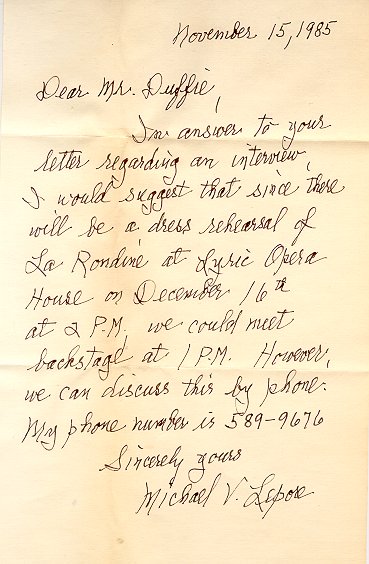
|
Thereafter Salmaggi stuck to management. His big chance came in
1933 when Managers Cecil Mayberry and William Carroll were stuck with an
expensive lease, and no show, at Manhattan's huge Hippodrome. Salmaggi proposed
filling the place with opera. Mayberry and Carroll asked for a $5,000 guarantee.
Salmaggi did not have a cent but promised the money anyhow. Advertising a
stupendous list of 53 operas (many of which were never performed) at 99¢
top, he raised the $5,000 before he had raised the curtain.
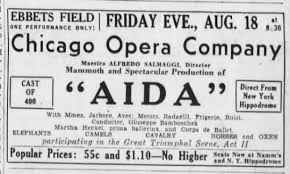
Thereafter Salmaggi presented opera at Manhattan's Polo Grounds,
Akron's dirigible hangar, Chicago's Soldier Field, Washington's Griffith
Stadium, the open-air stadium at Randall's Island, N.Y. At one Polo Grounds
Aïda, a Manhattan stable refused Salmaggi's check for the use of
its elephants, camels and horses, walked them out the center aisle during
the performance. Salmaggi shrugged philosophically. He had advertised
elephants and camels, and the audience had seen them. [Mostly from an article in Time Magazine, March 1, 1943] |
|
The first company to be known as the Philadelphia Grand Opera Company (PGOC) was founded in 1916. Short lived, the company produced just two operas before disbanding. The second company to be known as the PGOC was actually a company based out of New York City that was active in both NYC and Philadelphia. The company was founded by impresario Alfred Salmaggi (later founder of the Salmaggi Opera Company) in the spring of 1920 under the name the Italian Lyric Federation. The company's first performance was at the Academy of Music. The company changed its name to the PGOC in November 1920 after the financial backers fired Salmaggi. From this point on the company worked out of Philadelphia, although Salmaggi countered his firing by continuing to perform works with different singers under the name of the Italian Lyric Federation in NYC. Like the first PGOC, this company was also short lived, with its last production being held on Halloween of 1921. The Philadelphia La Scala Opera Company was an American opera company located in Philadelphia, Pennsylvania that was actively performing at the Academy of Music between 1925 and 1954. In 1955 the company merged with the Philadelphia Civic Grand Opera Company to form the Philadelphia Grand Opera Company. During its history, the company typically presented 12 operas each year at the Academy of Music during its annual season, giving over 350 opera performances at the house by the end of its final season. The company's last season was the 1953-1954 which was cut short due to financial reasons.As a collaborative note to Chicago, the first Chicago Grand Opera Company produced four seasons of opera in Chicago's Auditorium Theater from the Fall of 1910 through January, 1914. It was the first resident Chicago opera company, and was formed mostly from an arrangement to acquire the assets of Oscar Hammerstein's dissolved Manhattan Opera Company. The company also spent several months each year performing in the city of Philadelphia where it performed at the Philadelphia Metropolitan Opera House under the name the Philadelphia-Chicago Grand Opera Company in order to "satisfy the civic pride" of that city. |
|
|
Notice that all three names appear in this program from September 30, 1933 -- Salmaggi, Bamboschek, and Lepore (with his first name using the Italian spelling!) 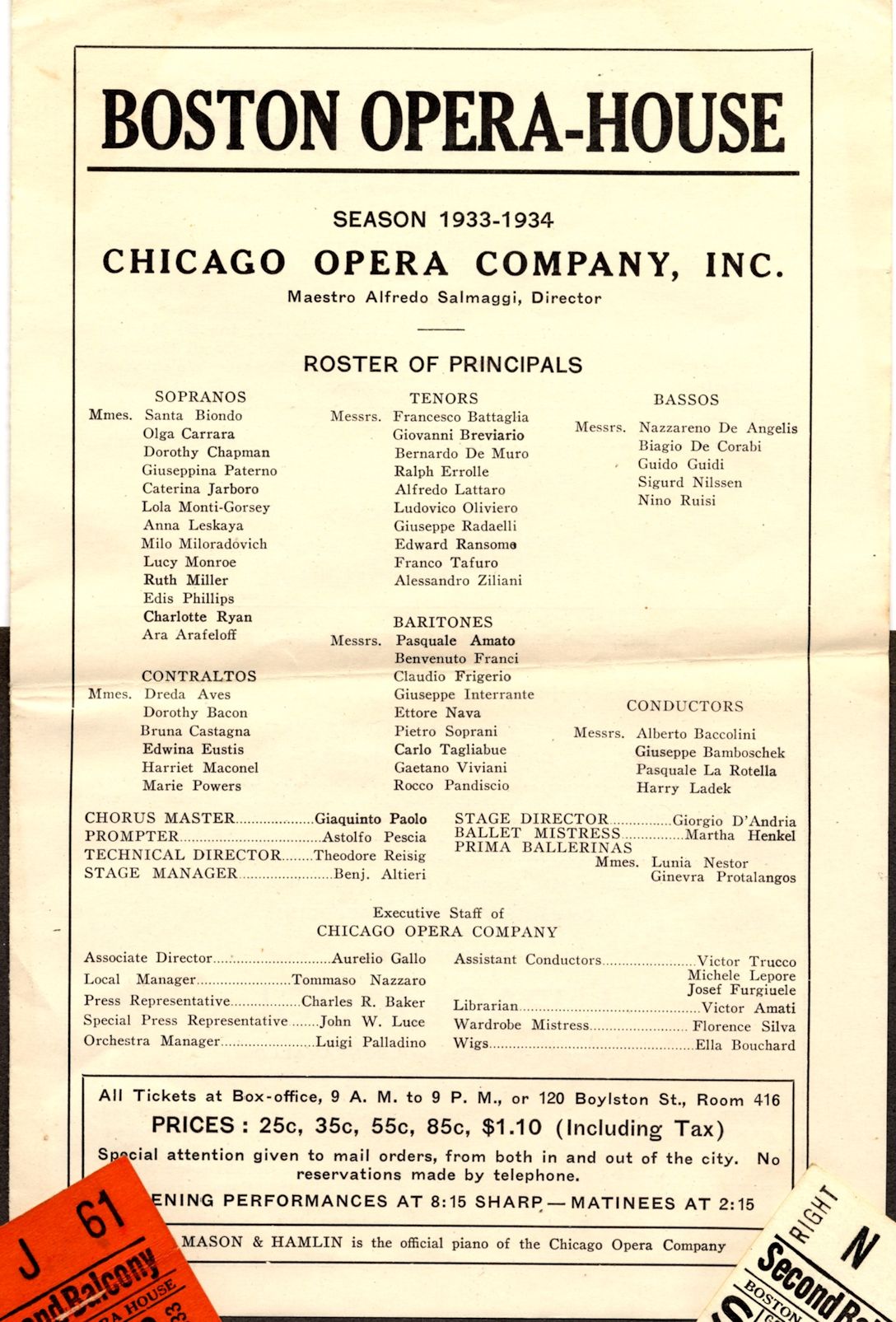
|
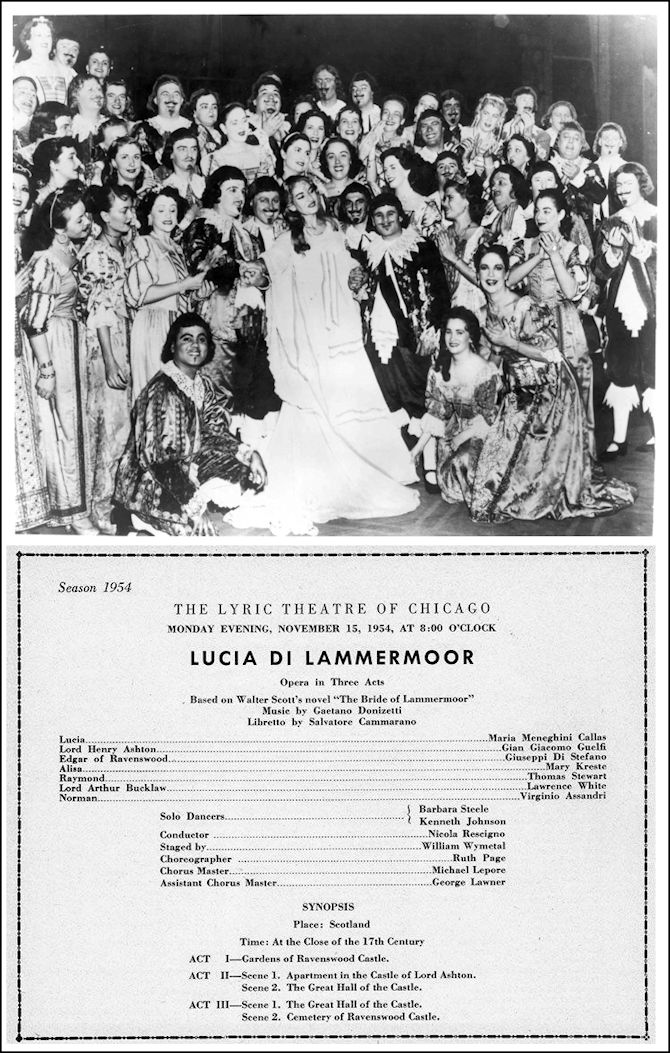 BD: When you first came in 1954, was there a chorus already
established, or did you have to start it from scratch?
BD: When you first came in 1954, was there a chorus already
established, or did you have to start it from scratch?
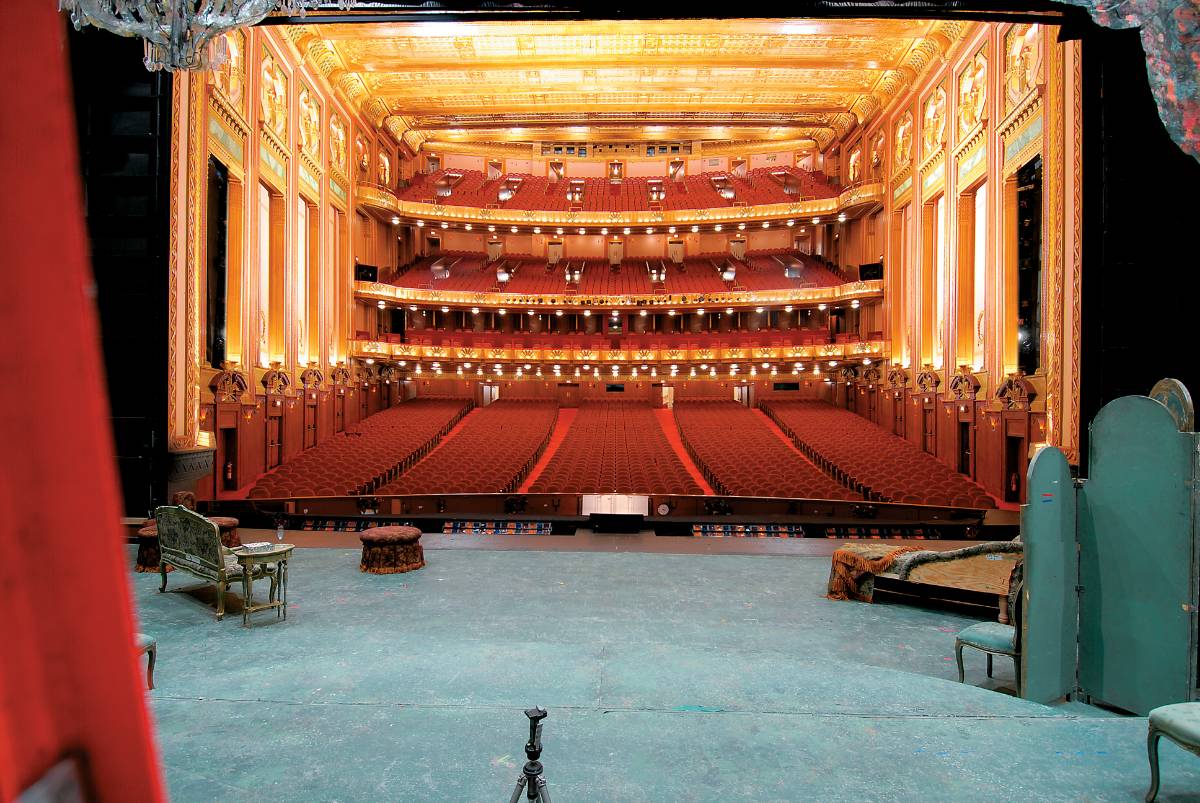
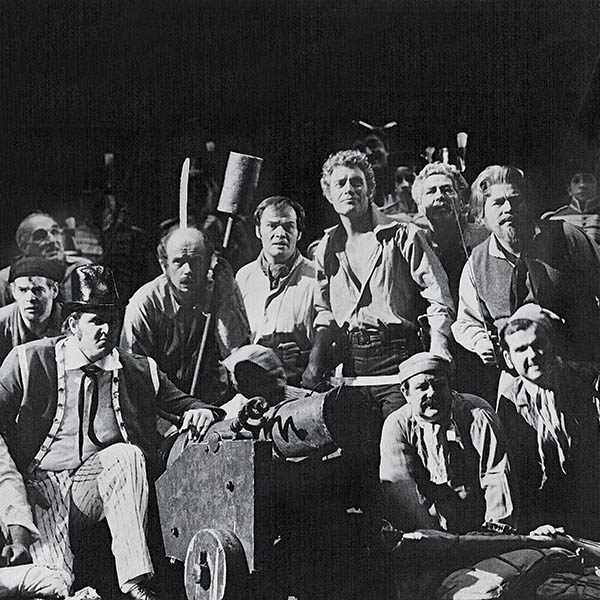
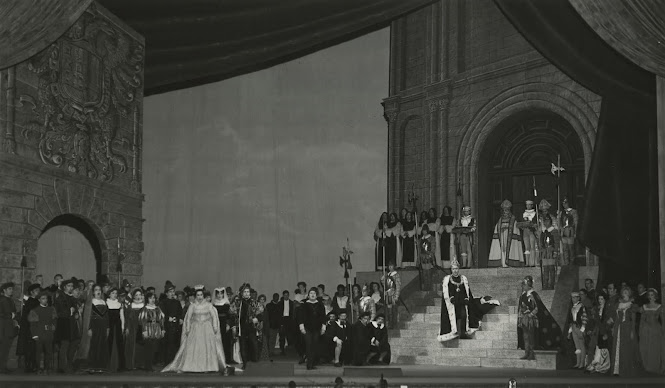
Don Carlo was given four times during Lepore’s tenure at Lyric Opera: 1957, with Sullivan/Bjoerling, Cerquetti, Gobbi, Rankin, Christoff, conducted by Solti 1960, with Tucker, Roberti, Gobbi, Simionato, Christoff, conducted by Votto 1964 [shown in the photo at right, and the program below], with Tucker, Gencer, Gobbi, Bumbry/Cossotto, Ghiaurov, conducted by Bartoletti 1971, with Cossutta, Lorengar, Milnes, Cossotto, Ghiaurov, conducted by Bartoletti 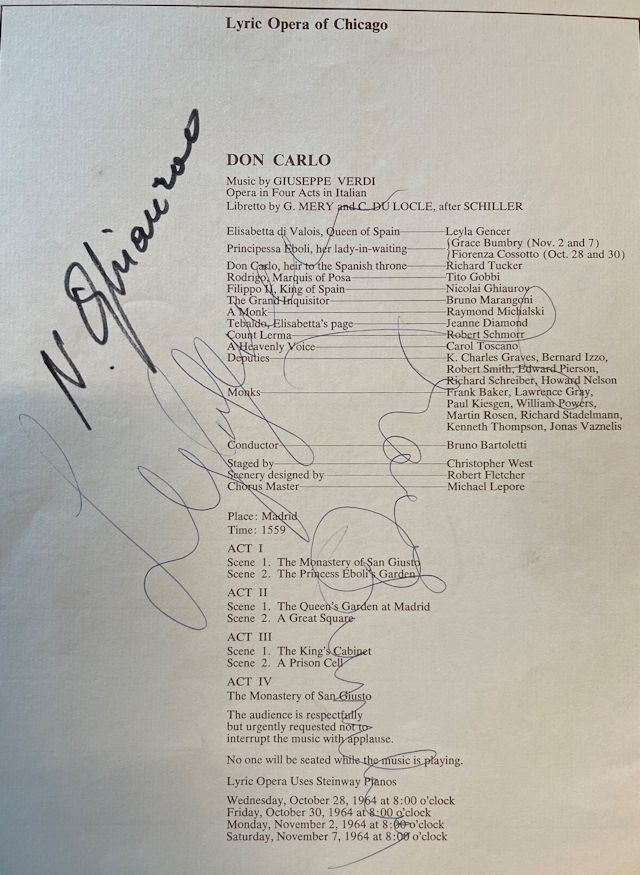
|
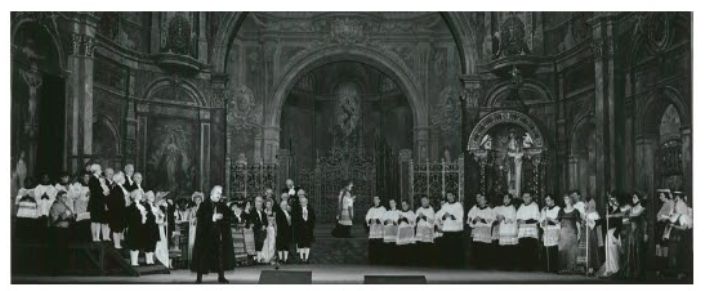

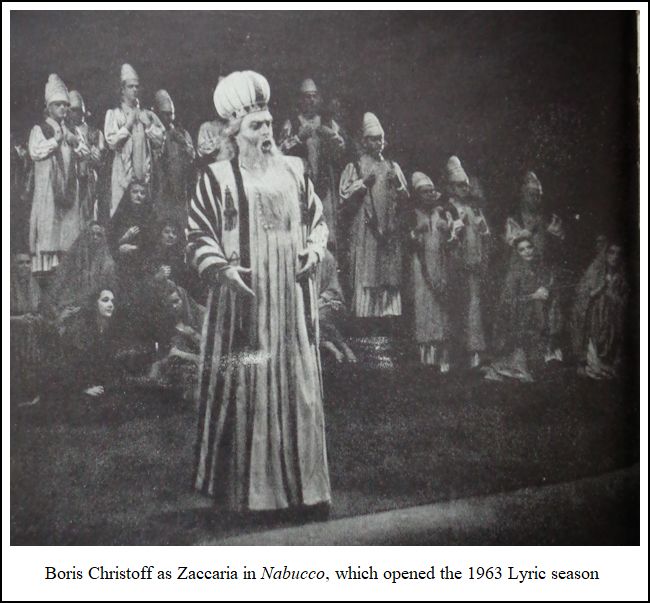 Lepore: I personally am not crazy
for them in the theater. It’s nice to know to what’s going on,
or that you know at a moment what is said, but for a person who goes to
an opera, the most important thing is that the person is musical, and that
the person loves music. Otherwise I can’t see why a person would
want to go and see an opera if they don’t have some kind of a feeling for
music. By looking up for the titles, it is a distraction from the
stage action.
Lepore: I personally am not crazy
for them in the theater. It’s nice to know to what’s going on,
or that you know at a moment what is said, but for a person who goes to
an opera, the most important thing is that the person is musical, and that
the person loves music. Otherwise I can’t see why a person would
want to go and see an opera if they don’t have some kind of a feeling for
music. By looking up for the titles, it is a distraction from the
stage action.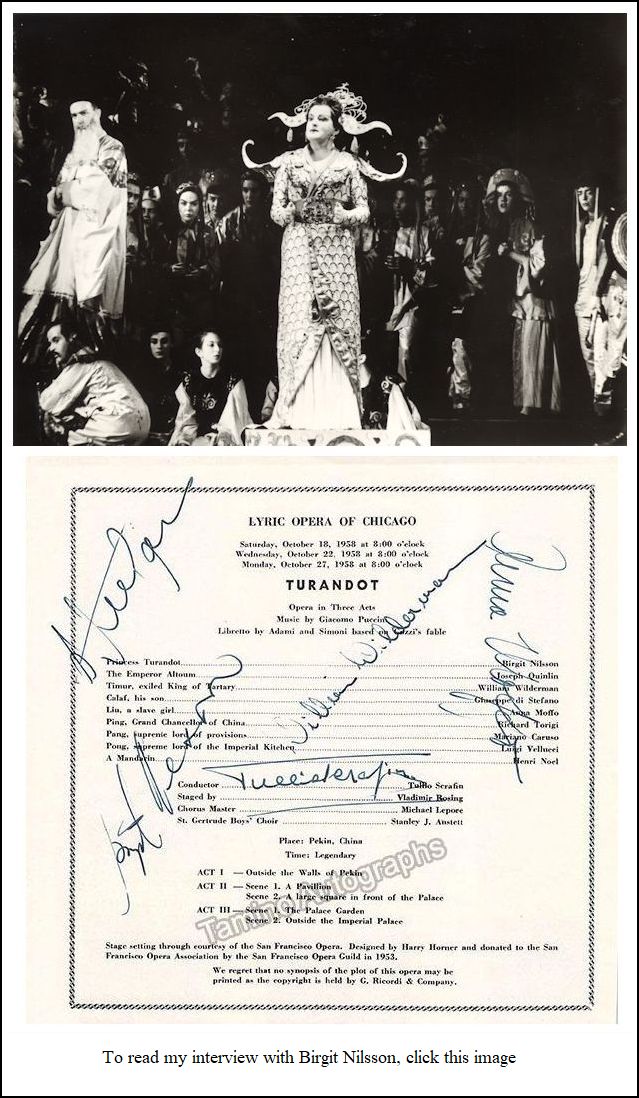
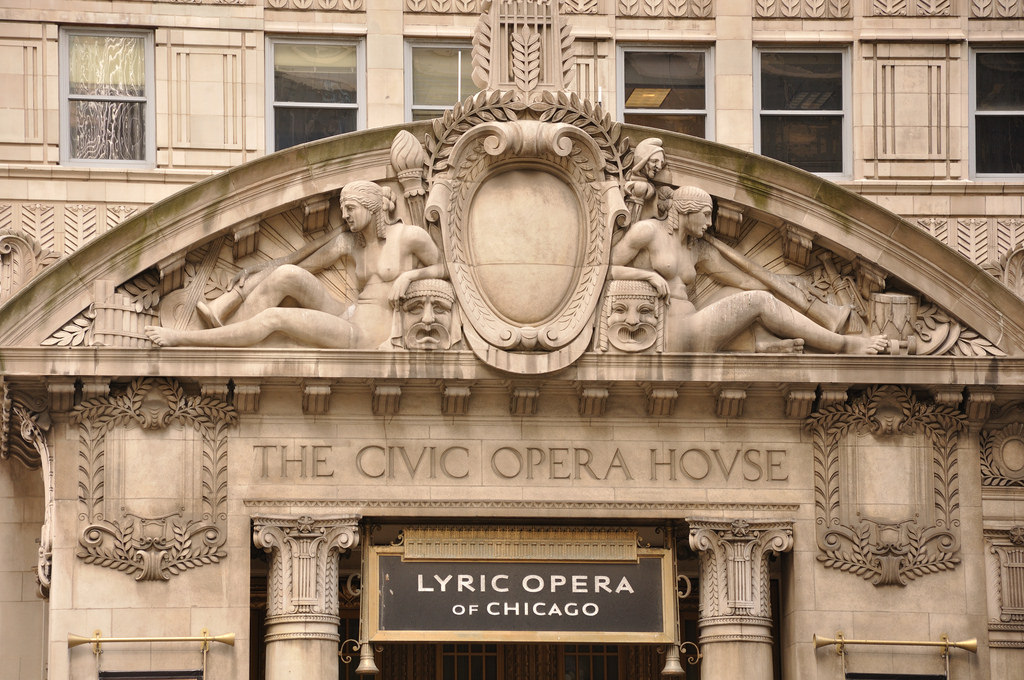

|
Dallas Summer Musical (DSM) began in 1941 as Opera Under the Stars in the Band Shell at Fair Park. Without the benefit of air-conditioning in the 40’s, performing outdoors was a better alternative than having to withstand the triple digit summer heat at an indoor facility in Dallas. The most important thing was for the audience to experience the magic of live theater. Opening night came on June 12, 1941, with a production of Sigmund Romberg’s Blossom Time, an operetta based on the life of Franz Schubert. The first season was co-produced by a group of local Dallas businessmen and The Schubert Organization in New York City, producers of touring theatrical productions. Ten shows, running a week each, were planned for the first season but the season was so successful that two additional shows were added. Ticket prices ranged from 30¢ to $1.10, and the season ended with a profit, despite the fact that a third of the performances were rained out. The onset of World War II prompted the cancellation of the season in 1942, but the summer theatre resumed operations in 1943 when a group of local businessmen established a non-profit organization to produce the season, under the name Starlight Operettas. A series of ten shows was presented that year, as well as in 1944. The State Fair Association decided the Starlight Operettas needed a full-time executive director. In 1944 it tapped legendary show business figure Charles R. Meeker to become the organization’s first Managing Director. After working with The Schubert Organization in 1941, Meeker providentially served as mentor to two young men – Tom Hughes and Michael Jenkins in the 1940’s and 1950’s who were to succeed him in later years continuing to bring quality entertainment to local audiences, decade after decade. In the 40’s the Starlight Operettas started to book more contemporary
Broadway musicals and made a number of physical changes to the Fair
Park Band Shell, including a moving platform system that allowed rapid
changes onstage. The organization introduced the star system at the
theater in 1947 – during a time when Operettas continued to be the theater’s
mainstay. For example the Starlight Operettas managed to persuade Mary
Martin to open her national tour of Annie Get Your Gun in Dallas,
which set box office records (105,000 people in two weeks). Two years later,
the organization revived Rodgers and Hart’s Pal Joey, with its
original Broadway star, Vivienne Segal. Almost written off at its debut in
1942, Pal Joey, thanks to Starlight’s production, returned to Broadway
the next season and won critical reviews. This system continued to characterize
the theater’s operation for decades, until audiences became more attracted
to the title of the show than to the name of the people starring in the
show. In 1951, after ten years in the Band Shell, the Starlight Operettas were able to move inside the Music Hall at Fair Park, thanks to the installation of air-conditioning. They also gained a new name as the State Fair Musicals during a move that not only boosted its audience comfort, but also allowed greater flexibility and creativity in the way shows were staged. The following year the State Fair Musicals previewed Porgy and Bess, with Leontyne Price and William Warfield. This innovative step paid off and the production was a sensation. After its premiere in Dallas, Gershwin’s opera went on to a worldwide tour. Throughout the 1950s, the State Fair Musicals kept the stars marching across the stage of the Music Hall – Debbie Reynolds, José Ferrer, Jack Benny, Gisele MacKenzie, Jeanette MacDonald, Judy Garland, and many, many more. The organization also brought in major musical directors, such as Franz Allers, who went on to conduct My Fair Lady on Broadway, and a number of top choreographers. Operettas began to fade from the scene in the 1950s, a decade when touring shows and “personality” shows also became part of the pattern of a typical summer season. The Jack Benny Revue in 1954 was the first of a series of personality shows that included such glittering names as Carol Burnett, Mitzi Gaynor, Carol Channing and Jim Nabors, among others, over the years. |
© 1986 Bruce Duffie
This conversation was recorded at Lepore’s home in Chicago on June 23, 1986. This transcription was made in 2021, and posted on this website at that time. My thanks to British soprano Una Barry for her help in preparing this website presentation.
To see a full list (with links) of interviews which have been transcribed and posted on this website, click here. To read my thoughts on editing these interviews for print, as well as a few other interesting observations, click here.
Award - winning broadcaster Bruce Duffie was with WNIB, Classical 97 in Chicago from 1975 until its final moment as a classical station in February of 2001. His interviews have also appeared in various magazines and journals since 1980, and he now continues his broadcast series on WNUR-FM, as well as on Contemporary Classical Internet Radio.
You are invited to visit his website for more information about his work, including selected transcripts of other interviews, plus a full list of his guests. He would also like to call your attention to the photos and information about his grandfather, who was a pioneer in the automotive field more than a century ago. You may also send him E-Mail with comments, questions and suggestions.